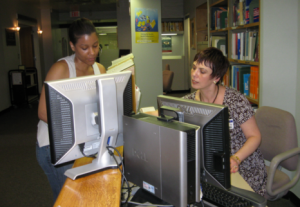A long time ago, on a college campus far, far away, a student stepped into her advisor’s office, bursting with enthusiasm.
“I’ve decided to get a master’s degree in library science,” she announced.
 The response was swift and devastating. “Are you nuts?” thundered the advisor. “You’ll ruin your life. You’re going to wind up all alone in an office somewhere, typing cards and stamping books. I thought we decided you were going to business school.”
The response was swift and devastating. “Are you nuts?” thundered the advisor. “You’ll ruin your life. You’re going to wind up all alone in an office somewhere, typing cards and stamping books. I thought we decided you were going to business school.”
I found another advisor.
Fast-forward 25 years. I’m now a librarian at Albert Einstein College of Medicine’s large academic medical library, and I spend my days quite differently from how that advisor would ever have imagined.
My profession is in the midst of a radical transformation, but the old myths like the ones my advisor believed in still persist.
So it is time, once again, to take a stab at debunking some of these myths. Not just for the greater good of the library profession, but to enlighten library users (and potential library users) about what librarians really do—and how that can help them.
The myths outlined below were gathered from responses to queries I posted to my colleagues on Twitter, Facebook, LinkedIn and Google+. (Yes, librarians have access to social media platforms, and we know how to use them. We’re in the information business, after all.)
Special thanks to Max Anderson, Roy Brown, Patricia Gallagher, Darcy Gervasio, Gail Hendler, Leigh Mihlrad, Tom Nielsen, Karen Sorensen and Vedana Vaidhyanathan for sharing their thoughts and ideas. Here are some highlights from the conversation.
MYTH: “Oh, you’re a librarian. You must love to read books.”
REALITY: Maybe. . . . People pursue library careers for a variety of reasons. Reading might be one of them. But teaching, searching and creating easy access to a complex web of information are actually what drive most librarians.
Librarians are expert multitaskers. A typical day could involve:
- evaluating new resources to add to the collection;
- formulating strategies for systematic reviews;
- teaching medical students the fundamentals of EBM searching (can you PICO?);
- helping authors with article publication (identifying potential journals, formatting manuscripts according to specific bibliography styles);
- tracking down elusive references;
- troubleshooting technical glitches (printer jams, WiFi outages, uncooperative citation-management software); creating metadata to make print and Web-based resources easier to locate;
- providing information to support grant applications;
- assisting students with the intricacies of thesis preparation;
- designing and coding user-friendly websites and search tools; and
- exploring mobile computing and other new technologies.
MYTH: “Libraries are obsolete. I get everything I need from Google.”
REALITY: Not so fast. . . . Yes, Google is a powerful search engine, but it does not supply the full text of scholarly publications. PDFs of many of those articles you find through Google are made available by your library’s journal subscriptions.
Just because information is on the Internet doesn’t mean that it’s free. Librarians spend a lot of time and effort negotiating subscription prices with publishers and vendors in order to make the most material available to their users—in the face of dwindling budgets. (The annual subscription for many science journals can cost more than that Porsche 911 convertible you’ve had your eye on.)
MYTH: “Librarians spend their days buying, shelving and helping people find books.”
REALITY: Yes, physical books are still important, and librarians can help you find the ones you need, but many library collections (health sciences libraries, in particular) have moved to the electronic world. This means you have access to e-books, e-journals, and other e-resources from just about anywhere in the world, 24/7. The library is everywhere; it never sleeps, and requests for help come round the clock.
MYTH: “Librarians are the gatekeepers to information.”
REALITY: Librarians help people access information, which can be stored in complex databases, placed on secure servers or buried like diamonds in the rough. Librarians are information detectives. We feed on a good challenge. We also like to share our knowledge by teaching about the most effective tools and techniques for finding information so we can empower our “clients” to become more information savvy.
MYTH: “Anyone can get a job as a librarian.”
REALITY: A master’s degree in library and/or information science is required to become a librarian. Many of us have second master’s degrees or Ph.D.s. Our support staff is dedicated and talented but they are not librarians even though they work in the library. Librarians are lifelong learners, working hard to keep up with the latest developments in our field. Just like other professionals, librarians attend continuing education classes and professional meetings.
MYTH: “PubMed covers everything I need for my research. I don’t need to search anywhere else.”
REALITY: PubMed is the premier biomedical database. However, when you are trying to do a comprehensive, exhaustive search (e.g., for a systematic review), other resources should be explored. A librarian can suggest appropriate databases and help create search strategies. However, if you’d like to search PubMed from your mobile phone, a librarian can show you how.
MYTH: “I don’t want to bother a librarian. I’ll figure it out myself. . . .”
REALITY: Please—bother us! We are here to help! Many libraries offer a wide variety of ways to get in touch with a librarian, including in person or by phone (or Skype), e-mail, text message and online chat. (I have even answered reference questions in the sauna at the gym!)
I hope this reality check has expanded your view of libraries and librarians. Our ability to blend traditional information resources and cutting-edge technologies empowers students, clinicians and researchers to focus on their mission, improving the quality of healthcare in the 21st century and beyond.

